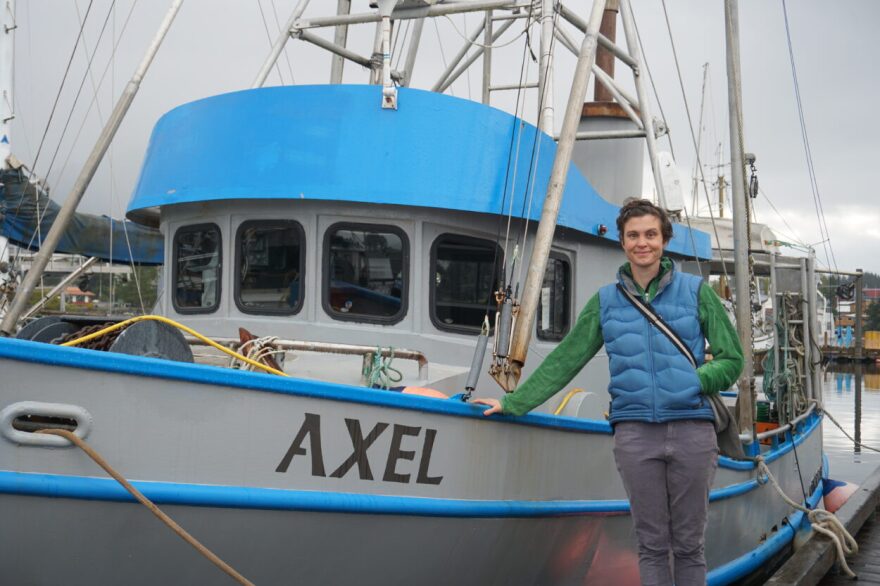It’s been a hard season for small fishermen in many parts of Alaska because of economic losses caused by the COVID-19 pandemic. But a seafood donation program started by a Sitka organization is helping bring some stability to fishermen and consumers during an uncertain time.
It started to drizzle as I stepped off the dock at Sitka’s Eliason Harbor and followed Jacquie Foss onto her and her husband’s grey and blue fishing boat, the Axel.
“You land your fish here, you clean here and you ice and store them in these totes before you put them down in the hold,” she said.
Living and working aboard the 40-foot troller is a tight squeeze when Foss, her husband and their two kids are all aboard. For most of the season, it’s just Foss’s husband and one crew member trolling Southeast waters for lingcod, coho and king salmon, while Foss runs the business shoreside. This was their ninth season commercial fishing, and it wasn’t an easy one, mostly because of the pandemic.
“So we’re low volume, high quality, and so typically restaurant markets,” Foss said. “A lot of the fish goes out whole and fresh. So, with the collapse of the restaurant industry, there was no market.”
They also worried that even if they could sell their fish, they wouldn’t be able to get it processed if facilities closed down because of coronavirus outbreaks. And the pandemic disrupted Asian markets, a relationship that was already strained because of tariffs and counter tariffs between the U.S. and China.
At the start of the season, the price for lingcod was half of what it was last year. Foss didn’t know if they’d be able to operate.
“When you’re starting out with unknown markets, unknown volume, unsure if you’re going to be able to sell your fish anywhere, there was a lot of anxiety early on,” Foss said.
But they did operate thanks to a seafood donation program started by Linda Behnken at the Alaska Longline Fishermen’s Association or ALFA and the Alaska Sustainable Fisheries Trust.
“I very quickly heard about people who were struggling here in town and that catalyzed us to start talking to local fishermen, local processors, about how we as commercial fishermen could help meet that local need,” Behnken said.
Normally , ALFA is a membership organization that advocates for sustainable fisheries and small fishermen. They also run Alaskans Own, a community supported fishery that sells seafood boxes to people around the country.
But Behnken and her partners decided to branch out to meet the local need brought on by the pandemic. They used grant funds from Catch Together to supplement the price of lingcod, so Sitka fishermen like Foss and her husband could start their season with some security. Then, they created a market for the seafood by delivering it to families who were struggling to make ends meet because of the pandemic.
“The pandemic really created a lot of need around Alaska and around the country from loss of jobs,” she said. “It’s just a particularly difficult time for people and then to be able to have really good quality food coming from Alaska’s healthy oceans. It’s just a really special to be able to provide that and make those connections.”
Soon, Behnken started getting calls from other communities asking her to expand. With the help of outside funders and organizations, they delivered seafood to military families in Alaska and to Tribal communities in the Pacific Northwest. Justin Zuelner is the head of The Wave, the foundation that helped distribute the seafood in the Pacific Northwest.
“We must support sustainable fisheries, to keep that economy going, because if we were not able to survive this, then we don’t have sustainable fisheries in the future,” he said. “That is such a critical investment.”
Then came the news about poor salmon runs. Southeast Alaska had the worst commercial fishing season for salmon in 44 years, and sockeye runs in Chignik Bay on the Alaska Peninsula failed altogether. The program brought salmon from Bristol Bay–where the salmon season was strong–to Chignik. And most recently, they partnered with Sealaska to bring nearly 50,000 pounds of sockeye to Tribal households in several remote Southeast Alaska communities.
Tiadola Silva works for Angoon’s Tribe, the Angoon Community Association. She helped organize the salmon donation for her community.
“Fish was very scarce this summer, so just receiving this 8,000 pounds from these organizations was just a very generous opportunity for us, enough food supply for our winter,” Silva said.
Normally, the community delivers excess salmon they’ve caught to elders. But this year, there wasn’t much extra to go around. Partly because of low runs, but partly because the local gas station had to shut down several times because of active coronavirus cases in the community. Without gas, people couldn’t get out on the water.
“You know, salmon migration patterns are not gonna wait for you, you just have to go out when the time is right,” she said.
The donation was personal too. Silva was worried she wasn’t going to have enough salmon to make sockeye dry fish this year, but now she will.
“I’m excited for this week because I know that there’s gonna be a bunch of smokehouses running and that’s my favorite smell in the world is just the smokehouse smell,” Silva said.
The program will continue distributions through the winter in Sitka. Behnken says if they get support from the USDA and other funders, they can expand and continue connecting fishermen with communities in need.
Erin McKinstry is a Report for America Corps Member. This story was produced as part of a collaboration between KCAW and Alaska’s Energy Desk.


